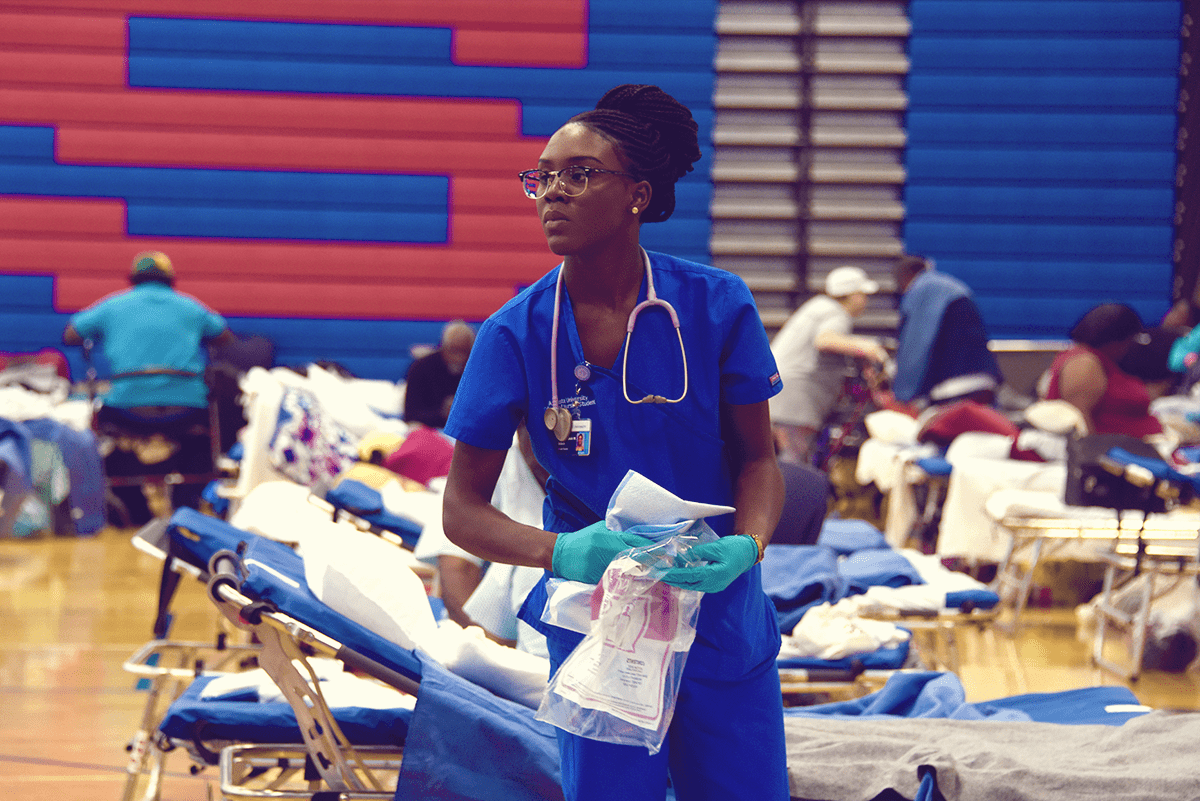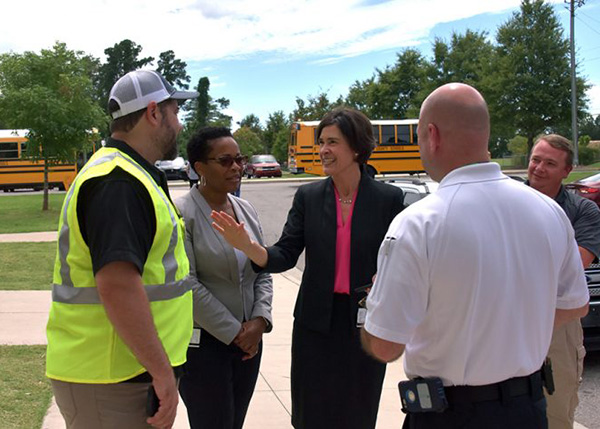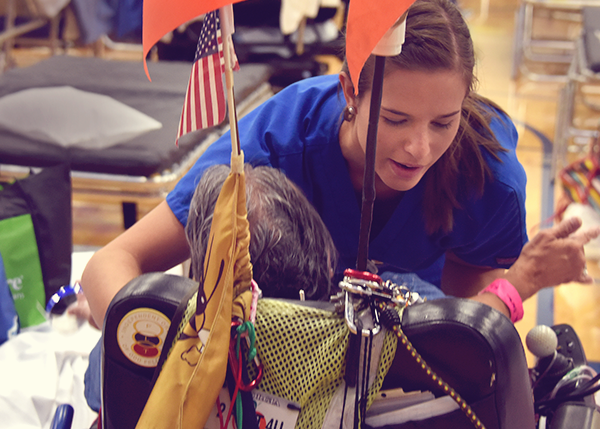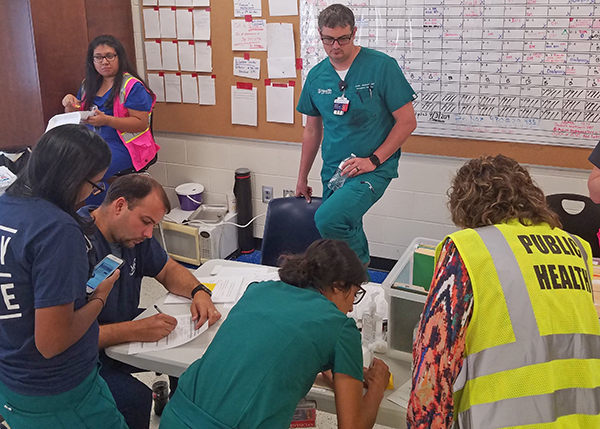
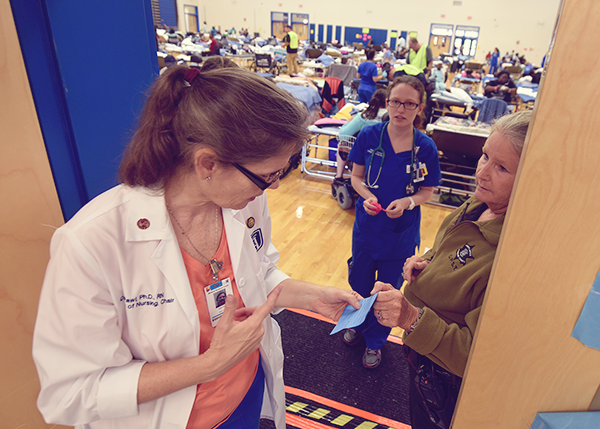
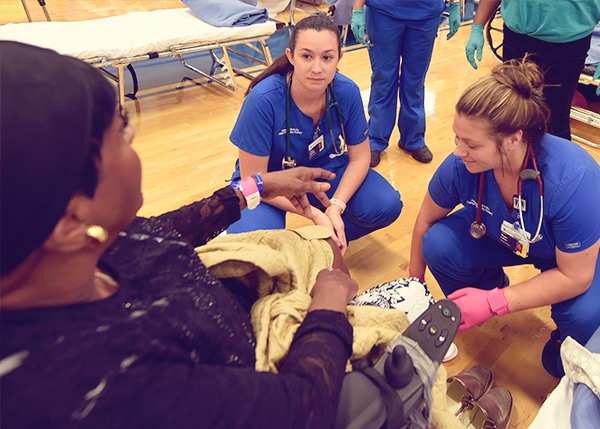
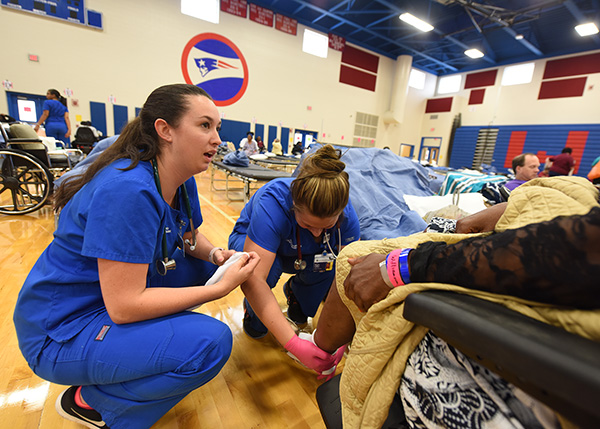
Ready to make a big impact?
The Augusta Medical Reserve Corps (AU MRC) is getting an exciting refresh! Please note that the AU MRC has changed the application process to join and the next membership application period will open this fall, and more details will be shared with our campus community at that time. We will then post a member application link for individuals interested in being a part of this in-depth, year-round emergency preparedness leadership program.
A Medical Reserve Corps (MRC) is part of the Citizen Corps program, a national initiative to mobilize and coordinate volunteers. MRC members are health professionals and others who are willing to be called in the event of a public health crisis or large scale disaster.
The MRC program provides a structure to pre- identify, train, credential and organize medical and public health professionals, as well as non-clinical personal to supplement and support health emergency response systems.
Communities benefit from having MRC volunteers ready to respond to emergencies. People volunteer for many reasons, but some volunteer for the MRC because:
Volunteers are at the very heart of the MRC. The existence of this nationwide, community-based movement is due to the willingness of volunteer medical and public health professionals to serve their communities in times of need. Without that generous offer of service, there would be no MRC.
Depending on the nature of the emergency, members may have clinical and non-clinical roles. Potential activities include, but are not limited to:
Non-clinical staff may be needed to:
The MRC Program has developed the MRC Core Competencies, which is a suggested guide for training MRC volunteers at the local level. Core Competencies represent the baseline level of knowledge and skills that all MRC volunteers should have, regardless of their roles within the MRC unit. They also provide a framework for units' training component and assist in describing what communities can expect of their MRCs. Because the core competencies establish only a minimum standard, units may choose to expand on the competencies in order to train volunteers at a more advanced level. Units may also choose to link the MRC core competencies to other existing sets of competencies for health professionals. For more information, please view our Core Competencies.
Emergency preparedness and response is a highly coordinated effort that allows communities to maximize their capabilities during times of extraordinary disorganization and stress. Volunteers may already know how to perform some of the necessary medical and health functions. In most cases, training as an MRC volunteer focuses primarily on learning local emergency and health procedures, trauma response techniques, use of specialized equipment, and other methods to enhance volunteer effectiveness.
Perhaps the most important part of training is learning how to work as a team member. An organized, well-trained MRC unit is familiar with its community's response plan, knows what materials are available, knows its response partners, and knows where its skills can be put to best use in a coordinated manner.
All MRC volunteers need to undergo some form of orientation to the Augusta University MRC, which includes an overview of the system in which the MRC's activities occur, whether in relation to emergency response or public health, or both.
Support/administrative volunteers receive guidance on how to perform their particular functions, which vary depending on the needs of particular communities. They may need to participate in practice drills if their duties interface with those of the front-line/direct-service volunteers. Overall, the training includes support skills training, communications, public speaking, and Incident Command System, or other local command systems.
Training requirements for front-line/direct-service volunteers is typically extensive and specialized. Generally, these volunteers receive training in primary emergency response and public health procedures, including basic life support and CPR; Community Emergency Response Team training; identifying the signs, symptoms, and treatment of hazardous materials (including nuclear, biological, and chemical agents); and basic first aid skills to deal with emergencies such as shock, allergic reactions, bleeding, broken bones, burns, chemical splashes, choking, eye injuries, skin wounds, dislocations, head trauma, heat exhaustion, stroke, and poisoning.
Liability protection standards require volunteer-based organizations to train their volunteers in accordance with all policies and procedures, particularly those intended to reduce the incidence of harm. Different localities are subject to different legal liability laws and standards. All volunteer organizations want to protect their volunteers; liability protection for volunteers is an advocacy issue and a reasonable concern for many MRC units.
Liability also is a highly complex area of the law, compounded by innumerable differences at the local level. Understanding and interpreting liability is based on individual cases and varied interpretations of the statutes in specific states. Because the rules and laws vary, it is not possible for the MRC Program Office to provide information applicable to all 50 states and to all jurisdictions within them. Even within a specific jurisdiction and given a specific set of facts, no one can predict with certainty whether a liability suit will succeed.
State offices may provide information about its liability rules. Some states offer greater protection to medical volunteers than others. Additionally, some response partners may be able to extend the liability and workers compensation privileges that normally apply to regular workers.
The MRC program seeks volunteers to assist with emergency preparedness and response efforts. Volunteers in the MRC program include:
No. The MRC program seeks medical and public health professionals to assist with emergency preparedness and response efforts. However, other volunteers who have no medical or healthcare backgrounds also are needed to properly conduct emergency preparedness and response efforts. Community members without medical training can assist with administrative and other essential support functions. These volunteers give their time on an ongoing basis in coordination with other experts willing to donate their time and knowledge for special aspects of the effort.
Major emergencies can overwhelm the capabilities of first responders, particularly during the first 12 to 72 hours. Medical and other health volunteers can provide an important "surge" capacity during this critical period. They also can augment medical staff shortages at local medical and emergency facilities. In short, communities often need medically trained individuals to fill in the gaps in their emergency response plans and to improve their response capabilities overall.
Possible types of "front-line" medical and public health volunteers include:
Individuals with a non-medical or healthcare background typically serve their community by assisting with administrative and other essential support functions. Possible types of administrative and other support volunteers include:
Although the MRC volunteers are ready to respond to disasters or emergencies, part of the MRC program's mission is to foster disaster preparedness. MRC volunteers also are called to help during non-emergency times.
During non-emergent times, MRC volunteers strengthen the overall health of Americans by participating in general public health initiatives such as flu vaccination clinics and diabetes detection programs. MRC volunteers also promote improving health literacy, increasing disease prevention, eliminating health disparities, and supporting public health preparedness.
Yes. MRC's are established throughout the state of Georgia. There are over 980 MRC units across the country. The AU MRC unit works collaboratively with MRC units across the state.
Volunteer availability is discussed during the MRC volunteer application process. MRC volunteers do not have to be available all the time. Some volunteers may only be interested in making a minimal commitment during times of crisis or for other specific community needs. These preferences are respected, given that they can be accommodated by the MRC unit's mission and work plan.
MRC Unit Coordinators match community needs for emergency medical response and public health initiatives with volunteer capabilities. They also determine prospective volunteers' availability and whether they have other obligations, such as regular work responsibilities, that might conflict with serving the MRC in times of limited advanced notice. Different people will have different amounts of time to give. Some may not be available year-round, and others may need to be utilized throughout the year to remain engaged with the MRC.
SERVGA is the online scheduling and notification system for the AU Medical Reserve Corps (MRC). This system will allows the AU MRC Coordinator to rapidly communicate with MRC members through text and email.
We require everyone take IS-100 and IS-700 Emergency Incident Command online training modules. The online training links can be found on AU MRC homepage under "Training”. Once you have registered, our office will contact you shortly to schedule a time for you to come in and complete some additional MRC volunteer paperwork prior to attending volunteer orientation.
Additional training courses are available to assist members in preparing for their role in a public health disaster. Information on available training courses can be found in the Training Section of the Augusta MRC Website.
• Receives request for assistance
• Seeks approval for deployment from leadership
• Notifies Registered MRC Members
• Obtains approval/permission from instructor/supervisor
• Signs up for scheduling and deployment via SERVGA
• Provides liability protections
• Supports member
• Provides training
In September, 2017, Hurricane Irma caused many GA counties to evacuate to safer areas throughout GA including Augusta. More than 400 Augusta University volunteers jumped into action serving in evacuee shelters across our community providing medical care and support to our neighbors from Chatham County.
